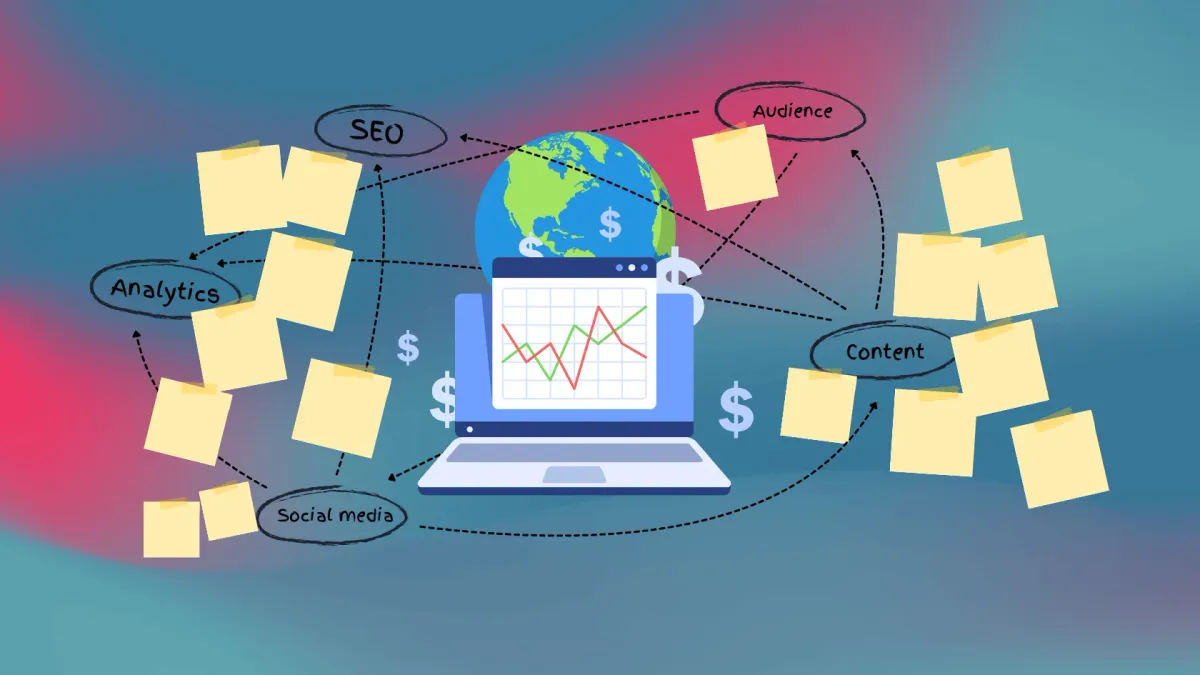Digital Marketing: Strategies for Startup Company Growth
Uncover effective digital marketing strategy approaches to boost your startup company's online visibility and customer engagement.

As a seasoned digital agency owner with years of experience in website development, design, and marketing, I've had the privilege of working with numerous startups and small businesses. One thing I've learned is that the digital landscape can be both exciting and overwhelming for new companies. In this comprehensive guide, I'll share my insights on how startups can leverage digital marketing to fuel their growth and establish a strong online presence.

Understanding the Digital Landscape for Startups
Before diving into specific strategies, it's crucial to understand the unique challenges and opportunities that startups face. As someone who's been in the trenches with countless emerging businesses, I can tell you that the digital world is both a blessing and a challenge for new companies.
The Importance of a Strong Online Presence
In today's interconnected world, your digital presence is often the first point of contact between your startup and potential customers. I've seen firsthand how a robust online presence can make or break a new business. Here's why it's non-negotiable:
- Credibility: A professional website and active social media profiles lend legitimacy to your startup. In my experience, customers are more likely to trust and engage with businesses that have a polished online presence.
- Accessibility: Your digital platforms are open 24/7, allowing customers to find information about your products or services at any time. This accessibility is crucial for startups looking to compete with more established players.
- Global Reach: The internet breaks down geographical barriers. I've worked with local startups that have found customers halfway across the world, all thanks to their digital presence.
"In the digital age, your website is your storefront, and social media is your word-of-mouth. Neglect either at your peril." - Personal mantra I share with my clients
Identifying Your Target Audience in the Digital Space
One of the most common mistakes I see startups make is trying to appeal to everyone. In the digital space, precision is key. Here's how I help my clients pinpoint their target audience:
- Develop Buyer Personas: Create detailed profiles of your ideal customers. Include demographics, psychographics, online behaviors, and pain points.
- Analyze Competitors: Look at who your competitors are targeting and how. This can provide valuable insights and help you identify underserved niches.
- Leverage Analytics: Use tools like Google Analytics to understand who's visiting your website and engaging with your content. This data is gold for refining your target audience.
- Conduct Surveys: Don't be afraid to ask your existing customers or potential leads about their preferences and online habits.

Essential Digital Marketing Channels for Startups
Now that we've laid the groundwork, let's explore the digital marketing channels that I've found to be most effective for startups. Each of these channels plays a crucial role in a comprehensive digital marketing strategy.
Website Development and Optimization
Your website is the cornerstone of your digital presence. As someone who's designed and developed countless websites, I can't stress enough how important it is to get this right. Here's what to focus on:
- Responsive Design: Ensure your website looks great and functions well on all devices. With mobile traffic often surpassing desktop, this is non-negotiable.
- User Experience (UX): A clean, intuitive interface keeps visitors engaged. I always advise my clients to prioritize easy navigation and fast loading times.
- Clear Value Proposition: Your homepage should immediately communicate what your startup offers and why it's unique.
- Call-to-Action (CTA): Every page should guide visitors towards a desired action, whether it's signing up for a newsletter or requesting a demo.
Search Engine Optimization (SEO) for Startups
SEO is a powerful tool for driving organic traffic to your startup's website. Here's how I approach SEO for my clients:
- Keyword Research: Identify terms your target audience is searching for. Tools like SEMrush or Ahrefs can be invaluable here.
- On-Page Optimization: Ensure your content is structured with appropriate headers, meta descriptions, and alt text for images.
- Content Creation: Develop high-quality, relevant content that addresses your audience's needs and questions.
- Technical SEO: Pay attention to site structure, XML sitemaps, and mobile-friendliness.
"SEO is not about gaming the system. It's about understanding what your customers need and delivering it in the most accessible way." - My advice to startups worried about SEO complexity
Video tutorial on conducting basic keyword research for startups
Content Marketing: Telling Your Startup's Story
Content is king in the digital world, and for startups, it's an opportunity to showcase expertise and build trust. Here's how I guide my clients in content marketing:
- Blog Posts: Regular, informative blog posts can position your startup as an industry thought leader.
- Case Studies: Showcase your successes and demonstrate how your product or service solves real problems.
- Whitepapers and E-books: In-depth content can be excellent lead magnets and demonstrate your expertise.
- Video Content: Whether it's product demos, explainer videos, or behind-the-scenes glimpses, video content can be incredibly engaging.
Remember, the key is to provide value to your audience. I always tell my clients, "Don't just sell; educate and inform."
In the next section, we'll delve deeper into social media marketing, email campaigns, and how to leverage technology for digital marketing success. Stay tuned for more insights and practical tips to supercharge your startup's digital marketing efforts.
Social Media Marketing for Startup Growth
Social media is a powerful tool for startups to build brand awareness and engage with their audience. Here's how I approach social media marketing for my clients:
- Choose the Right Platforms: Not all social media platforms are created equal. I help my clients identify where their target audience spends time and focus efforts there.
- Consistent Branding: Maintain a consistent visual identity and voice across all platforms. This helps in building brand recognition.
- Engage, Don't Just Broadcast: Social media is about building relationships. Respond to comments, participate in discussions, and show the human side of your startup.
- Leverage User-Generated Content: Encourage customers to share their experiences with your product or service. This builds trust and provides social proof.

Email Marketing: Nurturing Customer Relationships
Despite the rise of new digital channels, email marketing remains one of the most effective ways to nurture leads and build customer loyalty. Here's how I guide startups in crafting effective email campaigns:
- Build a Quality List: Focus on organic growth of your email list. Quality always trumps quantity.
- Segment Your Audience: Tailor your messages based on subscriber behavior, preferences, or demographics.
- Provide Value: Every email should offer something of value, whether it's exclusive content, special offers, or helpful tips.
- Optimize for Mobile: With most emails now opened on mobile devices, ensure your emails look great on smaller screens.
"Email marketing is not about bombarding inboxes. It's about delivering the right message to the right person at the right time." - My mantra for effective email campaigns
Leveraging Technology for Digital Marketing Success
In my years of experience, I've seen how the right tools can dramatically improve the effectiveness of digital marketing efforts. Here's how startups can leverage technology:
Marketing Automation for Startups
Marketing automation can be a game-changer for startups, allowing them to do more with limited resources. Here's how I help my clients implement automation:
- Lead Nurturing: Set up automated email sequences to guide leads through the sales funnel.
- Social Media Scheduling: Use tools like Sprout Social or Later to plan and schedule social media posts in advance.
- Customer Relationship Management (CRM): Implement a CRM system to track interactions with leads and customers.
- Chatbots: Use AI-powered chatbots to handle common customer queries and provide 24/7 support.
Data Analytics and Performance Tracking
In the digital world, data is your best friend. Here's how I help startups harness the power of analytics:
- Set Up Google Analytics: This free tool provides invaluable insights into website traffic and user behavior.
- Track Key Performance Indicators (KPIs): Identify the metrics that matter most to your business and monitor them regularly.
- A/B Testing: Continuously test different elements of your digital marketing to optimize performance.
- Use Heatmaps: Tools like Hotjar can show you exactly how users interact with your website.
Video tutorial on setting up Google Analytics for startups
Mobile App Development for Customer Engagement
In today's mobile-first world, a well-designed app can be a powerful tool for customer engagement. Here's what I've learned about app development for startups:
- Solve a Specific Problem: Your app should address a clear need or pain point for your customers.
- Focus on User Experience: A sleek, intuitive interface is crucial for app adoption and retention.
- Integrate with Other Channels: Ensure your app works seamlessly with your website and other digital platforms.
- Leverage Push Notifications: Use these sparingly but effectively to re-engage users and drive action.
"A mobile app isn't just a miniature version of your website. It's an opportunity to create a unique, valuable experience for your most engaged customers." - My advice to startups considering app development
In the next section, we'll discuss how to craft a comprehensive digital marketing strategy, overcome common challenges, and look at some real-world success stories. Stay tuned for more insights to help your startup thrive in the digital landscape.
Video on how to set up and use Google Alerts for trend monitoring
Case Studies: Successful Digital Marketing Strategies for Startups
Throughout my career, I've had the privilege of working with numerous startups that have achieved significant growth through effective digital marketing. Let me share a couple of success stories:
Case Study 1: E-commerce Startup Boosts Sales Through Social Media
One of my clients, a small e-commerce startup selling eco-friendly home products, was struggling to gain traction in a competitive market. We implemented a comprehensive social media strategy focused on Instagram and Pinterest, platforms where their target audience was most active.
Key strategies:
- User-generated content campaigns
- Influencer partnerships
- Shoppable posts
- Behind-the-scenes content showcasing their eco-friendly practices
Results:
- more than 200% increase in social media followers within 6 months
- around 150% boost in website traffic from social channels
- approx. 80% increase in online sales with a few months
"Social media isn't just about posting pretty pictures. It's about creating a community around your brand and values." - My advice to the startup's founder
Case Study 2: B2B SaaS Startup Generates Leads Through Content Marketing
Another client, a B2B SaaS startup offering project management tools, was having difficulty generating quality leads. We developed a content marketing strategy focused on addressing pain points in their target industry.
Key strategies:
- In-depth blog posts and whitepapers on project management best practices
- Webinar series featuring industry experts
- Email nurture campaigns tailored to different buyer personas
- SEO optimization for industry-specific long-tail keywords
Results:
- exactly 315% increase in organic search traffic within 1 year
- approx. 250% growth in email subscriber list
- doubled the increase in qualified leads
These case studies demonstrate that with the right strategy and execution, startups can achieve significant growth through digital marketing, regardless of their industry or target audience.
The Future of Digital Marketing for Startups
As we look ahead, it's clear that the digital marketing landscape will continue to evolve rapidly. Here are some trends I believe will shape the future of digital marketing for startups:
- AI and Machine Learning: These technologies will enable more personalized marketing at scale, from chatbots to predictive analytics.
- Voice Search Optimization: With the rise of smart speakers and voice assistants, optimizing for voice search will become crucial.
- Video Content Dominance: Short-form video content, like TikTok and Instagram Reels, will become increasingly important for reaching younger audiences.
- Privacy-First Marketing: With growing concerns about data privacy, startups will need to find ways to personalize marketing while respecting user privacy.
- Augmented Reality (AR) Experiences: AR will provide new ways for startups to showcase products and engage with customers.
"The future of digital marketing is about creating more immersive, personalized experiences while respecting user privacy. Startups that can strike this balance will thrive." - My prediction for the evolving digital landscape
As we wrap up this comprehensive guide, remember that successful digital marketing for startups is not about having the biggest budget or the most advanced tools. It's about understanding your audience, providing value, and consistently executing a well-planned strategy.
Stay curious, be willing to experiment, and always keep your customers at the heart of your marketing efforts. With these principles in mind, your startup will be well-positioned to grow and thrive in the digital age.
Conclusion: Empowering Your Startup's Growth Through Digital Marketing
As we've explored throughout this guide, digital marketing offers immense opportunities for startups to grow, connect with their audience, and establish a strong market presence. Let's recap some key strategies and emphasize the importance of ongoing learning and adaptation in digital marketing:
- Build a Strong Foundation: Your website and online presence are often the first touchpoints for potential customers. Invest in a well-designed, user-friendly website and maintain a consistent brand image across all digital platforms.
- Know Your Audience: Use data and analytics to understand your target market's online behavior, preferences, and pain points. This knowledge should inform all your digital marketing efforts.
- Create Value-Driven Content: Whether it's blog posts, videos, or social media updates, focus on creating content that provides real value to your audience. This builds trust and positions your startup as an industry leader.
- Leverage Multiple Channels: Don't put all your eggs in one basket. A multi-channel approach - including SEO, social media, email marketing, and content marketing - can help you reach your audience wherever they are.
- Embrace Technology: From marketing automation to AI-powered analytics, technology can help your startup do more with less. Stay open to new tools and platforms that can enhance your marketing efforts.
- Stay Agile: The digital landscape is constantly evolving. Be prepared to adapt your strategies based on performance data and emerging trends.
- Focus on Building Relationships: Digital marketing isn't just about promoting your product or service. It's about building lasting relationships with your customers and fostering a community around your brand.
Remember, there's no one-size-fits-all approach to digital marketing for startups. What works for one company may not work for another. That's why it's crucial to continually test, measure, and refine your strategies.
"The most successful startups I've worked with view digital marketing not as a series of campaigns, but as an ongoing conversation with their audience." - My observation after years in the industry
As you embark on your digital marketing journey, don't be afraid to experiment and even fail sometimes. Each setback is an opportunity to learn and improve. Stay curious, keep up with industry trends, and never stop seeking ways to provide more value to your customers. Alternatively, you can outsource this job to an experienced agency that has a strong focus on marketing and consulting solutions for startups and small businesses like my agency mediakular.
Finally, while this guide provides a comprehensive overview of digital marketing strategies for startups, the field is vast and constantly evolving. I encourage you to continue learning and exploring. Attend webinars, join industry forums, and consider working with experienced professionals who can provide tailored guidance for your unique situation.
Remember, effective digital marketing is a marathon, not a sprint. With persistence, creativity, and a customer-centric approach, your startup can leverage the power of digital marketing to achieve sustainable growth and success.
Here's to your startup's bright digital future!
I hope this comprehensive guide helps you navigate the exciting world of digital marketing for your startup. If you have any questions or need personalized advice, don't hesitate to reach out. Together, we can craft a digital marketing strategy that propels your startup to new heights.




